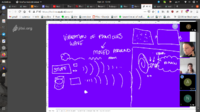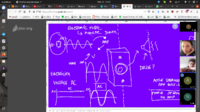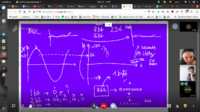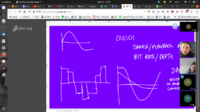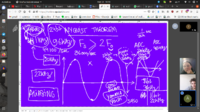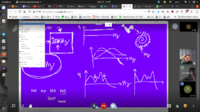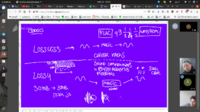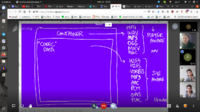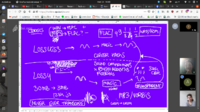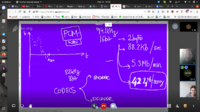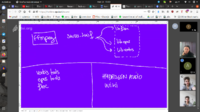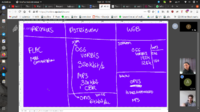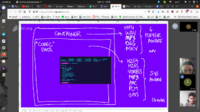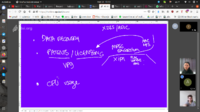User:Tisa/tutorial: Difference between revisions
No edit summary |
|||
| (30 intermediate revisions by the same user not shown) | |||
| Line 1: | Line 1: | ||
[https://pad.xpub.nl/p/speech-to-text speech-to-text] | |||
[https://pad.xpub.nl/p/mediawiki mediawiki my notes] + | |||
[https://pad.xpub.nl/p/mediawiki-install-party mediawiki install party] | |||
=w/Manetta= | =w/Manetta= | ||
2021-05-18 | |||
https://trac.ffmpeg.org/wiki/Encode/MP3 | |||
ffmpeg -i test.wav -codec:a libmp3lame -qscale:a 0 test_0.mp3 | |||
ffmpeg -i test.wav -codec:a libmp3lame -b:a 320k test_320.mp3 | |||
https://wiki.hydrogenaud.io/index.php?title=LAME | |||
https://wiki.hydrogenaud.io/index.php?title=EAC_Compression_Options | |||
=w/Manetta= | |||
2021-05-11 | |||
fixed pi, the electricity socket in the xpub studio stopped working | |||
Will try Semantic mediawiki install | |||
upload sound files asap to my wiki | |||
additional ref: https://pad.xpub.nl/p/15.3-prototyping-wed | |||
=w/Clara= | |||
2021-04-08 | |||
[https://pad.xpub.nl/p/2021-04-08_tutorial-clara pad] | |||
=w/Manetta, Michael, Aymeric= | |||
2021-04-06 | |||
[https://pad.xpub.nl/p/2021-04-06_group-crit pad] | |||
w/Amy&Clara= | |||
2021-03-30 | |||
[https://pad.xpub.nl/p/midwives2021 pad publication] | |||
[https://pad.xpub.nl/p/curatorial-matters pad exhibition] | |||
+ Harriet Care Rider session | |||
=w/Manetta= | |||
2021-03-29 | |||
using Cargo | |||
formats (tech) + forms (media) | |||
ref [https://www-jstor-org.ezproxy.hro.nl/stable/pdf/3178066.pdf?refreqid=excelsior%3A29034059d1671e944497124328658681 Situated Knowledges] | |||
ref [http://data-browser.net/db08.html data browser] | |||
you can input dates into a calendar | |||
'''How can it be generative? > Beyond indexal/archival praxis!''' | |||
> till next time: try uploading, options, combinations .... | |||
Licensing on wiki/of my work? | |||
=w/Amy&Clara= | |||
2021-03-26 | |||
[pad https://pad.xpub.nl/p/midwives2021] | |||
=w/Clara= | |||
2021-03-25 | |||
[https://pad.xpub.nl/p/2021-03-25_tutorial-clara pad] | |||
=w/Aymeric= | |||
2021-03-24 | |||
compression | |||
[https://pad.xpub.nl/p/compression pad] | |||
[[File:Screenshot from 2021-03-24 13-16-25.png|200px]] | |||
[[File:Screenshot from 2021-03-24 13-25-52.png|200px]] | |||
[[File:Screenshot from 2021-03-24 13-40-23.png|200px]] | |||
[[File:Screenshot from 2021-03-24 13-30-24.png|200px]] | |||
[[File:Screenshot from 2021-03-24 14-10-05.png|200px]] | |||
[[File:Screenshot from 2021-03-24 13-49-05.png|200px]] | |||
[[File:Screenshot from 2021-03-24 14-33-19.png|200px]] | |||
[[File:Screenshot from 2021-03-24 14-50-54.png|200px]] | |||
[[File:Screenshot from 2021-03-24 14-40-28.png|200px]] | |||
[[File:Screenshot from 2021-03-24 14-36-26.png|200px]] | |||
[[File:Screenshot from 2021-03-24 15-03-18.png|200px]] | |||
[[File:Screenshot from 2021-03-24 15-16-22.png|200px]] | |||
[[File:Screenshot from 2021-03-24 14-48-48.png|200px]] | |||
[[File:Screenshot from 2021-03-24 15-13-19.png|200px]] | |||
=Olia Lialina= | |||
2021-03-23 | |||
[https://pad.xpub.nl/p/ol pad] | |||
=Manetta= | |||
9-3-21 | |||
solo | |||
MediaWiki backup made [https://pad.xpub.nl/p/mediawiki-install-party] | |||
Collective session Tinc [https://pzwiki.wdka.nl/mediadesign/Tinc pad][http://eth.leverburns.blue/p/tinc_xx , tinc pad] | |||
=solo w/Steve= | |||
4-3-21 | |||
[https://pad.xpub.nl/p/4-3-21_steve-tutorial pad] | |||
... | |||
=Nishant Shah= | |||
[https://pad.xpub.nl/p/nishant_shah pad] | |||
=solo w/Michael= | |||
10-2-21 | |||
[https://pad.xpub.nl/p/10-2-21_michael pad] | |||
[https://pad.xpub.nl/p/2021-02-10-xpub2 collective] | |||
=solo w/Manetta= | |||
9-2-21 | 9-2-21 | ||
[https://pad.xpub.nl/p/9-2-21_manetta pad] | [https://pad.xpub.nl/p/9-2-21_manetta pad] | ||
[https://pad.xpub.nl/p/mediawiki-install-partymediawiki mediawiki install party] | |||
=w/Steve= | =w/Steve= | ||
Latest revision as of 10:45, 18 May 2021
mediawiki my notes + mediawiki install party
w/Manetta
2021-05-18
https://trac.ffmpeg.org/wiki/Encode/MP3
ffmpeg -i test.wav -codec:a libmp3lame -qscale:a 0 test_0.mp3
ffmpeg -i test.wav -codec:a libmp3lame -b:a 320k test_320.mp3
https://wiki.hydrogenaud.io/index.php?title=LAME
https://wiki.hydrogenaud.io/index.php?title=EAC_Compression_Options
w/Manetta
2021-05-11
fixed pi, the electricity socket in the xpub studio stopped working
Will try Semantic mediawiki install
upload sound files asap to my wiki
additional ref: https://pad.xpub.nl/p/15.3-prototyping-wed
w/Clara
2021-04-08
w/Manetta, Michael, Aymeric
2021-04-06
w/Amy&Clara= 2021-03-30
pad publication pad exhibition + Harriet Care Rider session
w/Manetta
2021-03-29
using Cargo
formats (tech) + forms (media)
ref data browser
you can input dates into a calendar
How can it be generative? > Beyond indexal/archival praxis!
> till next time: try uploading, options, combinations ....
Licensing on wiki/of my work?
w/Amy&Clara
2021-03-26 [pad https://pad.xpub.nl/p/midwives2021]
w/Clara
2021-03-25 pad
w/Aymeric
2021-03-24 compression pad
Olia Lialina
2021-03-23 pad
Manetta
9-3-21 solo MediaWiki backup made [1] Collective session Tinc pad, tinc pad
solo w/Steve
4-3-21 pad
...
Nishant Shah
solo w/Michael
10-2-21 pad
solo w/Manetta
9-2-21 pad
w/Steve
4-2-21 here and comments on ch[I] here
w/Michael
3-2-21 pad
w/Michael
27-1-21 the situationist times lab
w/Manetta
26-1-21 solo&group mediawiki install party https://pad.xpub.nl/p/mediawiki http://tisa.world/tisawiki/index.php?title=Main_Page
w/Steve
21-1-21 group Max & Chen commenting on my ch [II] https://pad.xpub.nl/p/II
w/Michael
13-1-21 [pad
w/Manetta
12-1-21 pad
w/Steve
11-1-21 transcribe from envelope
w/Steve
3-12-20
w/Steve
27-11-20
- How is my project publishable? A media to process as opposed to an interior contemplative process.
- I defined the vehicles, the infrastructure, the framework.
- being explicit: recognizing my own methodology - to what degree is that a method? there is an advantage in not pinning it down.
Rather than defending my position, I use positive terms: recognizing positive terms as a series. Specifying what does it do for me, to the audience ...
- collaboration, public > defining that. state it in positive terms (not being a part of the discourse, administration roles in a particlar cultural activity....) i don;t need to define anything i do in terms of what i am NOT doing.... What is collaboration, what are the affordances of it! > IN POSITIVE, my OWN terms. What is collaboration for me.
- collaboration + public .... >> models of collaboration...? What models exist....
- it happens in every conversation. hunch, intuition, .... interaction that i get in a conversation, in a meeting of othernesses. listening! What in my practice is like in a conversation?
- a semi-structured interview.
- This is how i do things. how conversations work.
- being sensitive to context
- open system! (vs closed system)
- a set of parameters, including my own reflective response. and a set of precepts that condition the performance, the situation... >> REF: Cybernetics and ghosts, italo calvino. (alphabet as an open system)
- What are the interactions (outcomes) that are prescribed by the performative anyways...?
REF: Kenneth Goldsmith : Uncreative writing (we dont need to write anything, we can also use the text that already exists. the art of editing)
REF: Olipou - potentiality of writing
REF: Italo Calvino: Cosmicomics (the aquatic uncle) REF: Primo Levi: Other people's trades (snake's piss + lipsticks)
[II]
- Speaking through something that has no voice, speaking of its materiality. Be much more specific about its materiality! (what Calvino does)
- +morphology of plastic! get into the specifics of it! go with the materiality of that!
- there is also factory, ... what kind of an interface you're making when you are a net (for the fish, for the fisherman, between the land and the air and the sea... - forms a parachute when its cast) ...
- "to cast a net".
- radar location.
- what supports the net and its material existence?
- finding out what the stuff is made out of!
- in the fancy world this would be called: object-oriented ontology
- + relationship between plants and the net. > miming the environment. they seem to be a part of the environment. Which plant is it? (A thistle).
- Am i the alien in the env? Who are we (humans) to them? A passing blink of existence in something beyond our (temporal) comprehension.
- Continuation: materiality of thought. thinking cannot be done without senses!
- Deutero learning = second learning order = learning 2. a higher primate. we can think in an abstract way, improvise on a situation.
- the context shapes the subsequent actions.
- improvisation: the way we think about things and learn! it is not a condition reflex. i am responding to the context. i can model the future. we can image, envision ... options per unit of time!!! that is what allows us to improvise!
- semiotic vision forming: reflexive: reflection: ... !!!! reflex, reflection (cognitive, surface phenomena)
REF: Gregory Bakes ... Steve sends more.
Make (comission)::: granular, molecular perspective! get as close to it!
REF: the octopus that is dreaming.
- making sure that the continuity of my practice is in my end project! feed further. there are no breaks, there are changes.
REF: George the Poet: bbc podcast, s1e2!
w/David Maroto
26-11-20
What he understood from my proposal&outline:
- create installation and website - go together
- installation = performative space, performative experience
- timeframe is unclear: when, where??
- with/for whom? how will i invite the audience...?
- website: complementing as an archive, process+archiving the process
- other elements: about: thesis: 3 chapters
- co-written essay
- ficiton story: point of view of a net: animism!
- manual::: ?? he didnt understand. based from transcriptions of interviews: how from interviews to manual??
- the constitution: emphasis on the improvisation and the medium of sound, +!
- methodology, means, output - he has an idea
- harder to understand: the content!!!
- i have the means, the platform for the process to happen: what kind of a process?
- performative yes, but what the performance is about!
- content, subject matter escapes him! >>> meta positions!
- the method is a way to produce meaning, already significant. a channel to communicate something, that escapes him.
- style in the writing: point of view of "an outsider" - him. > writing style comment: information could be more condensed.
- there is too much text. can be done, better conveyed in a more direct, a strict-forward fashion.
- bullet point style almost, going straight to the point.
- he works with editing. communication: clarity.
- to strip down 20-10% of the text.
- an exercise in being concise and precise.
- i am resistant towards this kind of confines, pinning down, reductionalism ... : flow, improv, and so on... he gets it: but still the ideas could be conveyed with less amount of text. as an outsider... could help him understand and be done easily.
- likes the idea of the constitution (the secret gallery ref from him)
- where, when?
- looking for a space that is external = good. using it only for this purpose!
REF: Richad Prince [2] , [3] , [4]
III
- interviews as toolkits: research method >>> output: manual
- how will i do the interviews?
- same set of questions?
- structured interview" 1-4
- semi-str: improvising questions that arise from an answer
- non-structured interview": what a conversation is. anyone can make questions.
- What is my role?
- Conversation open vs being an interviewer: learning to listen!
- you let the other person speak. >>> another micro composition. (shifting modalities?)
II
- many things will happen when i will actually write it. at the level of detail. when you get into the mud.
- point of view+the tone are important - what is the tone? who is speaking, what do they know, what kind of personality do they have - my personality? ... to decide while i write... trial and error.
- the fishnet is me.... and i find her. shifting point of view. double first-person character speaking?
- i already have the structure. that is already writing! now: filling up the gaps!
- "the fear of the blank page" - thinking about it, making plans, TOC, ... is already writing!
- i don't have to start from the beginning, I can go the modular way! start wherever! a composite work!
- continue filling the gaps. follow the feeling.
- Where does the writing finish? > word limit.
- constraints are not the bad thing. limitations! shape, form ...
REF: Oulipo!! [5]
w/Michael
25-11-20 ASSESMENT
- Making selections of the work, including it in the assessment presentation. Good things shouldn't get overlooked/misunderstood.
- also selecting examples from xpub1, radio implicancies, blob, DM, text SI#11, ... (bridging between my interests and the topics of special issues)
ABOUT ME
- Who am I, what do I do? Presenting myself.
- Proposition: Descriptions (of me) (screenshots) from different places (to include as a quotation in the proposal). > attempted but realized there is not enough material (or was written by me). >>> Keep the thought: i have many descriptions, they depend on contexts.
- simplifying and not outlinking!
- Network of my collaborative performance practice = the core.
- the platforms are interesting to me. experiences of doing stuff w/etherpad, video conferencing, ... theremin.... dynamic, motivated by put into different situations, using different tools. practice that is about playing with platforms and tools.
INTERFACES, institutions
- making screenshots of different sites (screenshot = denaturalizing), where my work has been published.
- interfaces are being made by my interactions with institutions! + self-hosting. I have my own platform, and I have many others as well. I decide to participate in them, in the network. But I don't NEED to, because I have my own.
- danger of self-hosting: you are an island while you want to be a network
- the webiste as iterations of ideas, my website is a node in the bigger picture of things!
LANGUAGE
- make titles for chapters!
- Clarity of language and self-presentation, hermeneutics, interpretation
- Do people understand the relation of my own and others practices' (using specific words, buzz words ...) ...
- I am making interfaces and interfaces are being made by interactions. I cannot control it (the discourse) completely.
- Complexities of how I present, how I use language ... to be the line that connects. (timelines come in hand here)
WEBSITE
- What will my own platform afford me? Also a space for online workshops? It is a RT platform. Social distancing might prevent IRL interactions > then The Constitution will still exist as a physical space, but will interact with the audience in the www.
- not just an archival website, also: didactic/educational, includes my learning PROCESS. (recording my learning... disseminating the knowledge)
- WEBSITE features: sketch! having images as interfaces to sound
- REF: Alison Knowles, Make a salad, also: taking off shoes, taking about them
IDEAS
- online warm-up/improv/room-check exercises (emphasizing the exact thing we are loosing with online communication): find similarities in the backgrounds, describe what you are wearing, etc.) ... xpub1 testing the exercises?
- fallback idea for livestreams. Its crazy, making a mundane birocratic space into a videobox... Early tv color bars and messages, white noise, ... fallback messages, ...
RED THREAD
- sensibilisation, human experience... very pragmatic ideas.
- Tracing a line from my previous work (Distraction manager, the text for SI#11, SI#12 work from radio implicancies - with mark (etherpad writing, performing, switching roles))...
- sense smithing sessions and other ...
[III]: interviews+the manual, workshops
- the website is the online component of the publication (the manual). the publication is a part of the website.
- the wiki: constructing and organizing/.... stays online.....
- how to credit people for ideas in the manual?
How to do everything and not burn out?
PREP FOR THE TUTORIAL:
WEBSITE
- december: set up raspberry pi + set up wikimedia + start uploading material
- conceptual structure > wikimedia structure (categories) > html structure (queries)
- What are the keywords?: material medium (painting, performance, sound, object, installation, writing, organisation) + solo/collaboration + place of showing (radio, gallery, space, public space, publication, nowhere) + timestamp of creation + conceptual keywords > non-existent yet (becoming in the process of archiving my own work, following the "red threads")
- wiki generating its own connections. a mycelial network. red link on the wiki (potential threads) - missing links.
- timestamps: allow other links to be possible.
- combinations of queries: search bar or static querying
- flow from one work to another (thumbnails and arrows)
- metadata display
- player for video and sound (automatically generated subtitles (speech to text) + text file
- Autorship? Protection?
- Guest tutor: dcht00
- last years' prototyping: distraction manager, the blob (mixer), research dynamics (imagemagick, saving pads, archiving), ffmpeg, icecast
- tools under construction: gyro/gps + pedal camera direct upload
w/Aymeric
24-11-20 Tisa&Damla
- Common to both of us: analog sensibility - methods, how tech/the world impacts individuals; human aspect, people
- Make distinctions between different modalities of engaging with other people (that imply a relationship with the other) (participation, collaboration). > precision on the terms > glossary of terms (using a certain word, sticking to its agreed definition (agreed by whom?)), it's a business of hermeneutics ...
- Are other people used as props? What is my position? Nicolas Bourriaud - mixing up genuine participation with audience as props, strict rules ... >>> What can I give to the audience - is crucial! in workshops, conversations, every transaction ... moments of action and connection and activation
- Am I in control of different levels?
- What is at stake?
- Distinction between what I am claiming my work/project is doing, and what my texts are saying. ?!
- They want to know about the backstage of my improvisation (access to the kitchen). chapter [III]
- What are the different tools and techniques that I am going to use? Describing different types of improvisation, techniques, methods, ...
Themes and thematics? be clear about it. Steve advises: being explicit: the way i work has a methodology.
- "This tension persists in my practice/research where I am materially, processually, conceptually and experientially exploring the dynamics and implications of structure+composition+form+system(s)+hegemony and process+improvisation+flow+subconscious+collective+chaos+empowerment. They coexist, entangle, mingle with each other, interact. I am currently in the process of unlearning the notion of binaries and dynamicizing my systems of thought. "
- Aymeric says that in my writing, I am constantly drifting. The decision on when to adapt my way of communicating my ideas (in order to be understood). Should I change my articulation to be understandable by others? Creating my own vocabulary ...?
- Am I, in the way that I speak about it, constantly obfuscating my work? (that is what he claimed). My work speaks for itself, it is experiential, one encounters it (a performance, a workshop, a text, an image, an object, a conversation, the totality of me when meeting me). The texts I write about my work (especially the proposal and the outline, are just a way to make it graspable in its raw stages (when material/experience cannot speak for itself). In that regard, they are speculative and fragile constructions, that are yet to become fully.
- Filtering the unnecessary noise. > How do I know what is noise now?
- particip art, remix culture, audience ...
- todo: define any kind of terms that imply a relationship with the other
solo w/Michael
16-11-20
- going through my project proposal and thesis outline
- my website: archival and dynamic, documentation of my practices
- The disclosure of ideas (copyright and security, intellectual ownership?)
- linking all my works in an intuitive narrative (through keywords/categories), creating pathways that one can navigate. > What are the keywords (specifically)?
- There is a sense of time and concept that tie works together. (red threads)
- branching, keywords, clouds, narratives, hypertext, linking structures
- metadata: semantic (general knowledge about the work and facts) + episodic (particular experiences, concepts, ideas)
- using mediawiki instance on my raspberry pi. (having a tool that makes an index) + queries (from wiki to web).
- WHAT IS THIS WEBSITE TO OTHER PEOPLE?
- tools: pedal camera, gyro (relative motion within itself, triangulation)/gps.
- ref: Constant, the iterations project (my refs in connection: radadar & corporeal whispers)
group w/Michael
9-11-20
tisa: text to speech also to deal with recordings, how to translate into a website... sound improvisation where lyrics suddenly appear, how to display that ... /comparing mistakes of the tool ... (gentle/deepspeech?) ... how to situate in xpub/tech cybernetics? (concern of how to "fit").. (.. steganography also histories of transcriptions (pauses, hesitations, ...) Robert O... - indexing podcasts work (gentle tool), precise timing http://lowerquality.com/gentle/ deepspeech - incorrect transcriptions+precise timing, phoneticizing every sound
>>> did the imagemagick bash script > make mine better. see here for documentation
>>> NLTK part of speech tags nltk book
solo w/Amy&Clara
3-11-20
Notes from the tutorial + transcription of the recording:
- mapping out my own methodologies, developing them, getting to know/recognizing the ways that i work.
- always: trusting the process, finding strategies to establish the flow.
- these practices (improvisation) as a way to counter the weight of structure, order, birocracy, social contracts that we might feel infecting our bodies in everyday life.
- REF: Clementine Edwards > material as kin (plastic). She is linking personal experience to history of the material. New materialism, kin, queering of genealogies.
- neighborliness - mapping a personal connection to material
- What is the nature of my collaboration/connection?
- How would i teach/describe my process to others?
- Objects as sites of relationships. (elasticite, found materials - I find and collect and connect.) - PERSONAL relationship to the object and RELATING
- object-oriented ontologies
- Clara:Mapping my own methodologies: How would I describe my process?
- I have visions, something that sticks with me. Mostly it's an image, a parallel I can draw. >> Actually: I don't know! I don't have a studio ... my own room, making it into a studio, hoarding materials > jump-starting the process again!
- I fell too much into words and concepts, constant declarations and descriptions of things - this kind of a rational order, systematization of things and I want to go beyond that. To be messy with material, thinking WITH it.
- the objects that I am fascinated by: the net, the rope: as something that is structured, something that pertains to structure, that wants to control the flow of things. I have these objects, observing where they lead me.: (there is more: finding the objects on a beach > collecting > stinky > preservation (material options: epoxy, container formaldehyde, salt, sugar, ...) > [one branch: scanning+printmaking experiments (embossing, indigo paper)] > experiments with salt - crystallizing them > noticing the edges of the cups, how salt stays on there > had to wash the cups > want to make clay/ceramic cups + sculptural nets/network.
- One idea, one found object brings about some other possible direction and then I just flow with it. I don't know what it means yet; I want to get to know the work. I don't want to be/believe in this "birocratic" way of making art aka. Having an idea and then making the work on the basis of that (a mimicry, the realism way). (structured institutional settings, breaking free from that)
- Amy: Is it necessary for me to think about methodology? It feels like I want to get away from it.
- I don't think methodology is something you can dismiss, ignore or move away from. I think it is always present, even if it is the "methodology of flow". There has to be some ways in which I work in, I want to explore these ways, and afford myself to float and not be certain about things - perhaps this is a methodology as well.
- Amy: Talks about phases of doing and phases of thinking alternating.
Reflecting - doing - reflecting. Making and reflecting - are simultaneous. Thinkering.
- making a book of methods (an overview, a report)
- giving a name to MY OWN methodologies. conjuring it by giving it a name. can abandon it with time ... the name is a costume, a vessel that I ride upon.
- I already know the methodologies, I just need to consolidate them.
- Idea for a name. It is kind of stupid, but it embodies the "fictional dichotomy" between structure&improvisation/flow. It is: TM (Tisas' methodologies/trademark) > it is still general, focused around me. It is not specific enough. How would I describe my actions?
- the net (i am drawn to the material and to the idea (wrapping around, ordering things, it contains a structure and it is also chaotic). I spoke about it being an image. An "oracular net", a vision (connected to the other world). Structures and networks - the net is very present.
- going through old hard-drives. All of these structures were present in my subconscious at least since 2014.
- the net as a framing tool. Something that encompasses something else. What is inside, what is outside, what is the permeable membrane, what are the dynamics from/towards the inside/outside. the red thread. a net is comprised of threads. connections of roots.
- semiotics - visions
- paranodality. > What is something that is neither the net, neither the fish, neither the sea? Which one of these is the paranodal element of this (fishing) dynamic? Perhaps the water. > David Foster Wallace - This is water, paraphrased in a joke: There are two fish in the sea. An old fish and a young fish. And the old fish asks the young one: How is the water? And the young fish says: What water? ... You know, ignorance is bliss kind of a moment.
- There is plankton as well! It is the water, but not. It has luminocity. You can only see it at night. Plankton as the network of beings, the nourishing aspect of water. > Swimming in plankton, looking at the stars. A psychedelic experience of micro-macro and floating. A reverse constellation, a reflection and its own thing as well. Plankton = noise?
- A collaborative process - mirroring each other and also generating. Sometimes they are the telescope.
- Archival book of visual research: I am fixing the book (binding mechanism). I am printing out ~60images per month that I am collecting on my surfs of the internet and my strolls around the world, filling up this book with very spontaneous, instinctive visual materials. All the images are ran through an imagemagick script, a filter that unifies them (b&w).
- It is a book without a spine! Overwriting the prescriptive order, the initial intention, the initial order (it is like a mollusk - a creature without a spine, with a shell). If you don't agree with the order, you can shuffle.
- The spine: a secretary function. The spine communicates with the rest of the body the order that is coming out of the head (and the other way around). If you don't have a spine what happens to the order? It is a distributed network, control is spread.
There is an intitial formation of the book - it is malleable, changeable, open to whoever is the collector of the order (myself/my future self) - parallel to going through my harddrives - it is the last formation of ideas from 6 years ago. And now I can see the connections, reorder the connections based on the last time capsule, the last formation.
- Would anybody dare to shuffle this book? Once it is a sculptural object, it has a certain no touchy feel to it.
- The timeline is important to me. The monthly snapshots. Could there be an inner narrative to the images that is worth noticing? If I would mix them up, another narrative would be there. Not the narrative that follows the traces of the flow.
- An object which you can do an archaeological research on.
- It is an archive. It is important that it maintains a temporal order. A form of navigation that I find important - the traces/breadcrumbs of my flow. I need documentation to understand where I came from and how I got here. > I do this all the time. This is a stable point in my methodology. I am systematic in the way that I document it. I want to trace back the thought. It is hard to keep up, because some things are messy and mixed up and the structure then fails. > I have a portrait of the mess. Freezing the process, the journey. The routs that I took are important. Is it because I want to be able to recreate? Why is it necessary to freeze?
- I think its is something that is deeply imbedded in me, it is something that has something to do with the way that I was brought up. Also: rationalist thinking, understanding CAUSALITY. Cause and effect. Not for the sake of reproducing it, but for the sake of grasping it, being able to think it.
- I am afraid of the exact thing that I am researching and fighting for so much. The fact that I am researching improvisation and flow has a lot to do with the way that I am constituted as a person; which means that I have a bias towards rationality and structure. For me, improvisation is a field of liberation, testing my own limits and possibilities of transgressing this inner bias.!!
- Why is it necessary to freeze the process? Perhaps, I am not completely liberated yet.?
- On one hand it is all about improvisation, flow, being able to move, the responsive net (the process) & on the other: the documentation is rigid. > the roots in my methodology.
- Improvisation in the process, and when the process is done, it must be frozen. (the process is never closed down-finished. works are static snapshots of the process).
*Process is ephemeral, documentation is almost a contrast - it is a fossil. Documentation is a contrast - encrypting, framing, FOSSILS
- Performance art - resistance to documentation (documented for presentation sake).
- It is also very pragmatic for me: If I want to have a career, I need to have documentation. > What kind of documentation? There are many ways.
- REF: Tehching Hsieh, long duration performance artist. Clever ways of documenting > check out.
- What is the reasoning behind the fossilization of improvisation? Why do I choose that? Interesting tension. This is what I do - why do I do it? In what terms do I describe the reasons (locating it in the field of performance art - commentary on that).
- Scores! Documentation that is generative (in improv), it allows another kind of practice.
- REF: The book of graphical notation
- to score = to carve within, to be able to break it. > you score something so you can make the material do what you want it to do, to break it.
- What I've been doing now with the sound documentation of my vocal improvisations within a musical context: transcribing lyrics/words that occur while I am in the subconscious flow of improvisation. Trying to learn from this, mapping my brain: What am I thinking? What is important for me to say when I am under the gaze of other people/presenting something to the public? What else can emerge from a passing thought? Can it be expanded in a meaningful way? Generative conceptual things are coming to life with this.
- I am documenting/taking snapshots/archiving/freezing/fossilizing, but something generative comes out of that in my process. I take one bit of information and apply it further, work with it, expand it, mutate it (into another work, an expanded idea, ...) The vision progresses.
Received references: &check!
- Graphical notations
- Notations by John Cage
- Clementine Edwards: talk & event
- Tehching Hsieh - documentation
&make an overview of key ideas
group w/Michael
group w/Michael
12-10-20
speech to text commandline tools. &research mail responses
group w/Amy&Clara
6-10-20 Pauline Oliveros, deep listening, article
Listening to the "podcast" conversation - notes:
- Write your insides/insights
- Soft/self publishing
- Academic discourses non personal
- Relating the i to the wider context
- Shameful deceitful position of the I?
- Tutor being implicated in the students project, you feel responsibility, it creates anxiety
- "you cannot parent for someone else"
- Retreat vs Pendulum - extremes (responses to anxiety)
- What a midwife does? Consults, comforts, trust, gives methodologies
- Teaches how to.
- Learning style, how feedback is generated
- "Consensual teaching"?
- Students telling you what they need. - Do they know?
- Isnt it the role of the tutor to intuitively understand, make effort to get to know the meta of the student, go beyond what is being said.
- What can we expect from you?
- Midwifery - taking a paternal/maternal role
- The student is the parent
How do you learn? pad
group w/michael
5-10-20 pad Develop a bot that helps us develop our research. Possible different input sources (image, text, sound, ...).
Social etiquettes. (##, ...)
&write down the idea
group w/michael
28-9-20 pad Installing an infobot on IRC.
individual w/michael
23-9-20
Transcription of the recording:
- How does technology relate to my practice (improvisation, performance, sound, writing)?
- I'm interested in hacking the human, the subconscious, the habitual behavior, the social contract - improvisation does all of that. Some systems, some ways in technology have a similar striving. Which ones?
- tool > What technology derives from. The rock tool is already a technology. Conception of a tool and its effect on the human: how it externalizes the intent and provides more options to a being - options to change, shape, intervene in the outside world, gaining "internal powers" through that. Tool shaping the human. Alienation occurs (tech now: we have tools, but the intent is obsolete). I'm interested in this dynamics.
- When it comes to technology, my interests are of a conceptual nature. I want to know how systems work, what kind of dynamics they afford to a human being. I'm into behavioral and psychological (also related to improvisation: in my practice i research: what happened to a human in the post-Industrial revolution period and how to get back to the primitive/primal/instinctive/sensory.
- paradoxes: If I am making a tool that is fixing the damage that other tools have made > am I not the douchebag in this situation? AND Systematizing improvisation, rationalizing the sensory = tricky business.
- script > making "poetic" scripts that follow the syntax of coding, but are read by humans. Scripts become compositions/exercises for a human being to run in a certain time frame of the day and produce data that might not have been regularly produced by the habitual approaches to how we do things. This can be applied to any medium - thoughts, spoken, written, painted, moved, etc.
- The notion of composition (systematization of the flow) - can be a repressive act. I have to grind through the lineage to understand it better. How can structuralization enable and allow more freedom. A response to the external structures of repression. (anarchy is tricky). We mimic the repressive patterns we were conformed to (even while attempting to abolish them. Imagining the (im)possible.) What is another method of another reality - that can be very inner, subconscious, changing the habitus. Disobedient technologies/technologies for disobedience. Making yourself in the relation and also in the opposition to what is established as "normal/accepted" (this is not how you do music). Normalisation.
- Daoism. Dao = flow. In relation to improvisation. How does it relate to technology? There is always a workflow, how one thing leads to another, the dangerous notion of optimization.
&link to prescriptive technology
- Rituals in the ancient past are composed. A gathering, a "performative" activity. The presence of inner rules, not explicit, rationally explained/stated. What happens when there is nothing prescribed in a structured manner?
- Formulating my research while doing it. Having a good system of annotation. Following the flow of the idea, of the overarching flow that is happening (to the thought, conceptuals, practices) > How to archive and represent it? Using the wiki.
- Avoiding the division between analog and digital (mark also) - physical? material? (tiny technology, invisible but very material (conditioned by materiality))
Notes during the tutorial:
- The world is so scripted already (like fuck Société de spectacle). Does it make sense to make new scripts.....? >>
- A nother paradox (line of tension), a dangerous one: scripts for humans/composition - just another set of rules, an establishment of a "new, better" social contract or whatever else. Playing with fire.
- What is the lineage?
- What is the aim?
- What is the tension? > between structure and chaos, between improvisation and composition.
- It is not about the preferred one or another, it is about strategizing a co-existence that is not repressive.
- Such composition that allows for agency, empowerment, sensibility, choice and subjective decision.
- Script as a ritual. Development of scores, compositions, "Instruction-based art"
- Cognitive capitalism, the social networks are profiting directly from tricking our sensorics. Attention is being grabbed, impulses directed, intuition overwritten by an addictive accumulation of hormonal stimuli - dopamines. How to produce them differently?
References M. gave:
prescriptive technology (tells u what to do) > doing a specialized job, planning - negative side of it, oppression ("externalization of intent/intention"), design for compliance, limiting your agency, possibilities
vs
holistic tech - artisan doing something independently, making decisions, has control over entire process, understanding pieces fitting together
+reciprocity > (=intra-action, rhizome)
Alison Knowles
- generative poem computer program
- https://www.damnmagazine.net/2016/09/07/the-house-of-dust-by-alison-knowles/
- https://git.xpub.nl/XPUB/AHOUSEOFDUST/src/branch/master/AHOUSEOFDUST.ipynb
- +her other recipes
- fluxus tradition of events
- code is a trigger
- desert journalism: http://lowerquality.com/desertjournalism/
IRL group w/aymeric
22-9-20
Transcription:
- I am deriving from my established practice - improvisation in different mediums (sound, vocal, text).
- I consider improvisation as a domain where habitual behavior and social contracts are questioned/challenged. The aspect of "hacking the human mind/the human intelligence", finding strategies that overcome habitual behavior /indoctrination, systems that produce us/, enhancing sensibility, exploring subconscious modes of operation.
- Questioning normalization.
- Distraction manager. Technology that re-humanizes the human. Sensibility, awareness, intuition - crucial terms.
- I don't want to make a critique of technology. Using conceptual parallels and syntaxes of technology in order to shape the human.
- Using the concept of the script as something that can be run by a human being. It is a practice of COMPOSITION, exercises for a human being in an everyday life practice and with this, produces data. The script can be run within an environment of any kind of a media (text, movement, sound, etc.)
- Building hardware tools that capture the FLOW, the intuition, the Dao (the electrical current of chi that runs through the body, guided by movements, protocols, practice).
- I don't wanna pin down my research into rationality and labels too much. I have to let myself float around and have as little labels as possible (until a certain moment in time when i establish a structure in which data that i produce is situated in.)
- Technological aspect:
- archiving data that is produced through running the "scripts" (as linguistic tools, poetry).
- How technology can analyse or predict improvisation // have an overview of repetitive patterns within the flow of a specific individual. > AI> Cybernetic loops?
- Invention of a TOOL. What is a tool to a human? From intuitive beings towards having tentacles of tools, we got away from sensing, from bodily mechanisms. I want to get back into the body through the development of "human intelligence".
- I want to make tools that fix the damage that other tools did to us as humanity (as primal beings). /I am unfit to follow the dictate of technology, I get tired, thirsty, my back hurts from sitting down./
- The paradox: to make a tool that fixes a tool.
- The paradox: using technology to mediate/meddle with the human, to systematize the flow, to rationalize the sensory.
- The formats:
...
- text, scripts/compositions/exercises
- interviews, phone call, letter (w/practitioners, theoreticians, believers)
- captain's diary research log, making a system that manages my research = research tool
- performances
- IRL workshops (CSS - composing sensibility sessions)
- hardware
- ... &add
- I'm into the human, that is the point. But post-anthropocentrically, I guess. I think animals should be idols to humans. & the cyborgs? (was this a joke or something true?)
- Am I going to work alone? Of course not, I want to work with many others.
- I want to be hands-on, to have too much stimuli, because I believe that when you stress the brain, you get some genious shit out of it. Burnout ... ?
Comments from Aymeric:
- Missing non-personal references. How does all of my thoughts/work connect to existing practices and research - how does it connect?
- instruction-based art. 60s. Conceptual art. (scripts/scores + performativity)
- Where do I situate myself in relation to this lineage?
(masculine, repressive, white, male, ...) > more into: Pauline Oliveros.
- (Is it really a male 70s thing and I should be opressed by it? (lol!).)
- Improvisation that gets into structuralized, rationalized systems: it is a battlefield, it is a moment when two completely other worlds intersect. I am interested in this tension. Systematizing improvisation. Rationalizing sensority. /Knowing that these dichotomies are artificially constructed through discourse, and that in reality everything is in primordial flux anyways./
- We live in a world that is scripted. By making environments where things /are scripted differently/ ...
- Even the scripts produce abnormalities. Conception of failure. There is no failure in improvisation, if people are real-time.
- Where do I situate myself in the realm of automation, scripting, proto-programmatic experiments in the art world in the 60s/70s were built upon the fascination for automation. Whereas only a few were critical. > I am making a critique of these tools or am I fascinated by machines and how they are scripting our lives, our behaviour.
- I am critical about it, I don't want my tools to automate anything. I want them to make us aware of options that we actually have. Even a script is a proposition of a way to work with certain constraints and then variabilize some notions within it. The script is like a poem that you read /each time affording new insights/.
- The distraction manager also didn't do anything, until the human processed the whole. Context of productivity, tools, workflows, methods, DM as a piece of software art that makes a mess is left to interpret...
- I am critical about it, I don't want my tools to automate anything. I want them to make us aware of options that we actually have. Even a script is a proposition of a way to work with certain constraints and then variabilize some notions within it. The script is like a poem that you read /each time affording new insights/.
- What the scripting methodology will be applied to? It's not scripting for the sake of scripting. You want to say something with this. What do I want to tell my audience with this? (lineage, history, instruction-based art) + RELATIONSHIP that I have with technology. + or - to technology > Where do i pose myself there?
- Where to situate the practice, what does it tell us. Find a way to locate myself into different types of references.
- For me it is really about the heightened ability of intuition, sensibility, interaction, awareness, ... real-time, spontaneous.
Technology and the society that has been produced by it, is very far from these notions. With my practice I want to explore and produce tools that bring the humans back towards them.
- Provide examples!
- instructions OR infrastructures that people make own instructions
- Guy Debord (SI) critique of automation ...
- Douglas Engelbart biography: https://www.dougengelbart.org/content/view/187/
- Book: Bootstrapping. Form of co-evolution of augmented humans with machines/computers. He came up with the mouse, ... Cybernetics as the future of the world.
- Research cybernetics more: reducing life and society to an algorithm.
- How can you describe an algorithmic process to talk about an ecosystem? If you can compute life, then you can manage life (as a software).
- Technology as positive empowerment (in these practices that seem connected to what I'm saying) but am resonating with that?
- Nam Jun Paik - exhibition in Amsterdam: https://www.stedelijk.nl/en/exhibitions/nam-june-paik
- french artist open calendar edited by others, then he does what they instruct. &name?
- Simon Yuill and Objscrs: software mimicking cctv surveilance, dancers improvise in a response to a machine algorithm
- Everything in our lives is in a way automated and protocolized, works within a certain protocol (social contract, arrows on the floor, ...) If we do have these protocols - then the improvisation aspect is even more crucial. As society and humanity we cannot avoid scripting, so what does it mean: to script for yourself, to take on the role of the dramatist, the director of your movements. To expand the life of improvisation over the edges of the performative stage. How can it spill out? I think it is also about options in time. In what way to hack that?
Preparation for the tutorial:
improvisation = a domain where habitual behaviour & social contract is challenged where awareness is amplified sensibility is enhanced exploring subconsciousness where mistakes are propositions
im interested in: human condition habitual behaviour human intelligence against normalisation and sameness bettering the (intra-active, inner, social) condition of subjects communication
to empower, to share, to afford options (to others&myself)
to engage in the activity of improvisation results in > updating operating systems interfacing yourself developing techniques within these media that influence RL&RT (outside of performative, beyond art) programming oneself (me providing a framework) hacking the human (intelligence) composition - scripts for humans
adressing the damage that the overusage of tech (and the social contract ..) had and is producing.
creation of a tool > externalization of intent
The "invention"/conception of a Tool.
As an extention of human intention (also the creation of possibility - expanding the options (for intention). The rock knife, the flute, language (communication).
We get more and more options, our arms multiply and stretch, we get tentacles, we go towards the outside - shape it, change it, intervene with our intents and the tools that are (also) responsible for our behaviour.
Intent is crucial.
Tools become ends for themselves.
Why are you doing something?
Aesthetisation of nothingness.
What is internal (what existed before the tool, the impulse behind the Intent) gets blurred, weaker.
Creating tools that repair the damage that tools caused - mainly desensibilisation.
Sensibility, triggers and cues, intuition are important here! FLOW.
Paradox: creating a tool that fixes a tool. Feedback loop. Rationaly constructed tool that trains intuition. Paradox: (linguistic) syntax of tech (Scripts for human beings / compositions / exercises / protocols) that meddle with the human (intelligence) (individual + collective - habitus, infrastructure, empowerment). == systematization of flow/of subconscious.
[AI learning, machine learning > a system that feeds itself data through certain protocols] (cybernetic loop)
procesuality, temporality, determination, objectives (why?)
What i dont want: a critique of tech. Consider the PRO of everything before the contra/the negative/the disruptive. I want to fill in the gaps (with gold), it is a process of addition through proposition. A positivist approach! (positive psychology focuses on what is good, what is working, enhances and nurtures that!)
IRL vs online: i dont want this to be my topic. Rather: using both, online gives more reach, more macro, more external, more access.
improvisation = flow. (media: sound, movement, text) as a research field/domain. what? intuition, impulse, subconscious, "animal/primal", awareness, sensibility, interaction, collaboration, researching and expanding ones own liminalities (of thought, of action, ...), inventing protocols of being, interacting, interfacing the world > why? lack of those is a damage. > who? public= anyone. from micro (proximate surroundings) to macro (through online) outreach. we all improvise all the time anyways > how well? > training for the everyday life.
(+social contract as a set composition (allows a lot of deviation - through mistakes/lapsus, decision/choice, disobedience, necessity, ...) making your own composition (rational vs intuitive, code of conduct, relationship, intra-action)
failing normality failure as a proposition (no errors in improv)

